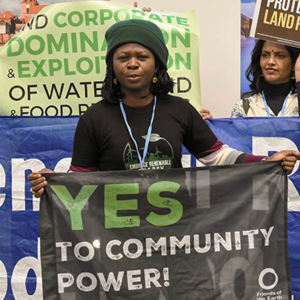The industrial food system, which dominates how we grow, distribute and consume food across the world, is under the control of global food and finance corporations. Their focus is to produce “agrocommodities”, such as palm oil, soy, corn and meat, for trade in global markets. Their central aim is to extract the highest profit possible.
“Agrocommodity companies operate in a way that looks as if they are above the law. Policies and practices are always in their favour, and the locals are the ones who suffer the most,” says Rita Uwaka, campaigner for Environmental Rights Action (ERA, or Friends of the Earth Nigeria) and for the Forests and Biodiversity Programme at Friends of the Earth International.
Since 2004, people have marked 21 September as the International Day of Struggle against Monoculture Tree Plantations. The day was created by rural communities in Brazil [1], to denounce and shed light on the impacts of monoculture tree plantations on their territories, and affirm their determination to resist such plantations and take back their territories from the hands of corporations.
Almost 20 years later, the campaign is still highly relevant. In Africa, expansion of monoculture plantations and agrocommodity farming is having devastating impacts on peoples and the environment, often more so for women. Agrocommodity corporations come to the continent with promises of development opportunities and economic empowerment, but “most of the times, what comes is the complete mismanagement of resources and deforestation as a result of the expansion in the different communities,” highlighted Rita.
This leads, among other things, to forced migration, as many communities are displaced from their lands to make way for monoculture plantations. In turn, there can be disputes and clashes over the newly scarce lands and resources. “The communities are moving away from their communal ancestral lands and entering new territories, and as a result this causes a lot of friction, conflict and communal wars in the communities,” added the campaigner.
When asked about the impacts of corporate expansion on farmers and people who live on the land, Rita was extremely clear: “People go hungry by the day. There is also a lot of poverty on the land, because these companies do not enrich communities.” It also affects the health and nutrition of communities, who depend on their lands and forests for food and medicines. Rita explained that even when forests are not cleared, they are barricaded by companies, thus preventing people from getting access to their own territories. Hunger, malnutrition, sickness and also violence are the most prominent results when agrocommodity corporations move in to an area.
Gender-based violence [2] is also widespread. “Women are being abused by some of the plantation workers in these areas and we are seeing a lot of teenage pregnancies,” stressed Rita.
Solutions for the people, by the people
ERA/Friends of the Earth Nigeria has been working alongside communities at local, regional and international level to expose the violations of these companies. But they are not doing it on their behalf. In Rita’s words: “We are giving them a platform to speak truth to power in different spaces. For example, women have been speaking out against the impacts of agrocommodities expansion in their area in regional and sub-regional spaces, for instance at the ECOWAS [3], the Economic Community of West African States.”
“Women have been speaking to lawmakers, to decision-makers, to policy-makers on how they are being harassed, how they are being discriminated against as a result of the policies in favour of the interest of corporations, and also how their children and husbands have been impacted by the activities of the companies.”
“People before profit” is the message promoted by ERA and the communities they work with. “Solutions should be people-led, people-driven. They should be solutions that connect lives, nature and people, not just to make profits in the international market,” highlighted Rita.
“In 2020, a group of campaigners from across Africa formed the “African group against monoculture plantations and agrocommodities”. Each year, they host an African Peoples Tribunal [4], together with organisations including Friends of the Earth International, Milieudefensie [5] (Friends of the Earth Netherlands), and the Rainforest Action Network [6]. This Tribunal serves as a space for defenders of the environment and human rights to expose the adverse impacts of plantations. In the 2021 edition, the tribunal examined 10 cases from 10 countries [7]: Cameroon, Gabon, Ivory Coast, Ghana, Mozambique, Nigeria, Liberia, Tanzania, Sierra Leone and Uganda. They found strong evidence of socio-environmental damages and gender-based violence caused by agrocommodity companies, particularly related to sugar cane, oil palm and eucalyptus plantations.
During the tribunals and in all their work with communities, ERA continues to highlight that agroecology [8] and community forest management [9] are key solutions [10] in this struggle. “Communities want to continue to practice a system of agriculture that puts the production in the hands of the people, and that is through agroecology,” said Rita. “Community forest management is the sure way of protecting our forests, preventing biodiversity loss and also mitigating the climate crisis [11].”
